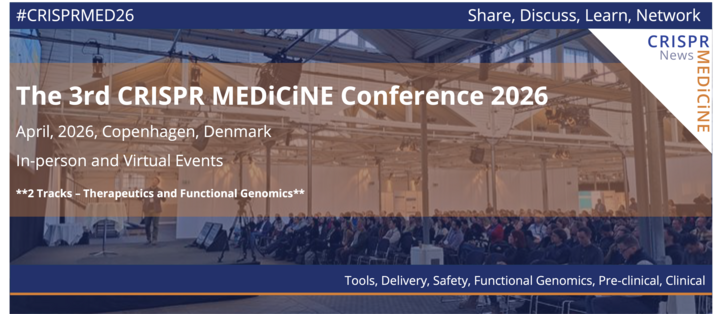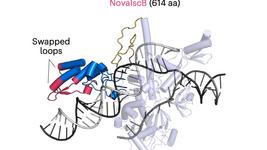CMN Weekly (29 September 2023) - Your Weekly CRISPR Medicine News
By: Gorm Palmgren - Sep. 29, 2023
Top picks
- Surgeons in Baltimore have transplanted the heart of a gene-edited pig into a man with terminal heart disease who had no other hope for treatment. It was the second patient to receive such an organ, and the first patient died after two months.
- A 27-year-old patient with Duchenne's muscular dystrophy has died after being treated with recombinant adeno-associated virus (rAAV) serotype 9 containing dSaCas9 fused to VP64 designed to up-regulate cortical dystrophin as a custom CRISPR–transactivator therapy. The findings indicate that an innate immune reaction caused acute respiratory distress syndrome (ARDS) and cardiac arrest 6sixdays after transgene treatment, and the patient died two days later.
Research
- A British study finds that most DNA repair defects do not modify the relationship between relative biological effectiveness and linear energy transfer in CRISPR-edited cells. The study concludes that the contribution of different DNA repair pathways to survival does not depend on radiation quality.
- A new approach to investigating RNA-protein interactions in neurons employs the CRISPR-based RNA-editing tool dCas13b-ADAR2DD, which was introduced and tested for its sequence editing capabilities in primary hippocampal neurons. The Dendra2 fluorescent protein was manipulated to showcase targeted RNA editing and successfully demonstrated the new technology.
- Chinese researchers have used a CRISPR-dCas9-based system to demethylate the Cysteine dioxygenase 1 (CDO1) promoter, increasing its expression. In vitro and in vivo, after engraftment into mice, targeted demethylation suppressed breast cancer cell proliferation, migration, and invasion.
- A new CRISPR-Cas12a regulation strategy is based on the powerful programmability of nucleic acid nanotechnology. Unlike previous complicated and rigid methods, only a simple switch of different external RNA accessories is required to change the reaction kinetics or thermodynamics, thereby finely and almost steplessly regulating the multi-performance of CRISPR/Cas12a, including activity, speed, specificity, compatibility, programmability and sensitivity.
- American researchers have integrated assembloids with CRISPR screening to investigate the involvement of 425 neurodevelopmental disorder genes in human interneuron development. It was discovered that, during interneuron migration, the endoplasmic reticulum is displaced along the leading neuronal branch before nuclear translocation.
Industry
- Precision BioSciences has received a Notice of Allowance from the US Patent and Trademark Office (USPTO) for US Patent Application No. 18/161,560, titled "Engineered Meganucleases That Target Human Mitochondrial Genomes." Once issued, the patent arising from this application will have a standard expiration date in April 2042.
- ProQR Therapeutics has terminated its late-stage ophthalmic assets to Laboratoires Théa. The company will now focus its Axiomer® RNA editing platform on targets for cholestatic and cardiovascular diseases.
- Revvity reports that it will roll out base editing reagents to increase access to preclinical DNA editing tech. A portfolio of reagents will now be available to preclinical researchers for use with the Pin-point base editing platform - in contrast to other base editing reagents that typically have to be custom-ordered or are otherwise difficult to obtain.
- Researchers at Rice University and the Baylor College of Medicine have won a $3.9 million grant over five years from the National Institutes of Health's Office of Research Infrastructure Programs to establish the Baylor/Rice Genome Editing Testing Center (GETC). The new centre will assist investigators across the US with somatic cell genome editing experiments in mouse models.
Detection
- Chinese researchers present a highly sensitive and rapid point-of-care system for HIV-1 infection based on CRISPR-Cas13a. The sensitivity, specificity, positive predictive value (PPV), negative predictive value (NPV) and accuracy were 91.81% (85.03- 96.19%), 100% (92.60–100%), 100% (96.41–100%), 39.14% (25.59–54.60%) and 92.22% (86.89–95.88%), respectively.
- Another Chinese research team reports a method for detecting Salmonella DNA and drug-resistance mutation by PCR-based CRISPR-lbCas12a. For 94 clinical samples, the process showed high sensitivity (100%) and specificity (98%) with less time (3 h) than plate culture (16 h) and conventional antimicrobial susceptibility testing (over 16 h).
Reviews
- CRISPR delivery with extracellular vesicles: Promises and challenges. This review comprehensively analyses the currently available strategies for EV-mediated delivery of CRISPR/Cas9. These strategies include cell-based, passive loading obtained by overexpression of CRISPR/Cas9, active loading involving protein or RNA dimerization, and loading into already purified EVs.
- Advances in Cas12a-Based Amplification-Free Nucleic Acid Detection. This article reviews the recent progress of Cas12a-based amplification-free detection methods for nucleic acids and finds that amplification-free nucleic acid detection technology based on CRISPR-Cas12a has excellent potential in the biomedical field.
- Gene-editing technology, from macromolecule therapeutics to organ transplantation: Applications, limitations, and prospective uses. This review highlights gene editing technologies, categories, mechanisms, challenges, current use, and future applications.
Conferences and meetings
- The first CRISPR Medicine Conference is officially launched and takes place in Copenhagen, Denmark, in April 2024. The event is your chance to meet the European CRISPR Medicine community from the academic and industry segments, join the sessions, the workshops and the network meetings to get the latest updates and find your next collaboration at the social events.
- The National Institute of Standards and Technology (NIST) and the FDA cohost a workshop on measurements and standards for advanced therapy on November 1 - 3. The event is at the Institute for Bioscience & Biotechnology Research (IBBR) in Rockville, Maryland, and is also open for online participation.
Commentaries
- A news explainer in Nature discusses how Dolly the sheep's legacy lives on in CRISPR-engineered cattle and cloned camels. Among the topics raised are how complex gene edits, such as inserting a lengthy DNA sequence or modifying multiple sites in the genome, are made in individual cells and implanted in egg cells to create cloned animals.
News from CRISPR Medicine News
- Monday, we published an interview with leading epigeneticist Gabriella Ficz, who has used CRISPR technology to investigate the interplay between DNA methylation and cancer. Her latest findings reveal the heritability of artificially induced disease-specific methylation patterns in primary cells, the mechanisms that might contribute to cancer initiation, and also hint at future therapeutic and preventative avenues.
To get more of the CRISPR Medicine News delivered to your inbox, sign up to the free weekly CMN Newsletter here.
Tags
CLINICAL TRIALS
Castration-Resistant Prostate Cancer, CRPC, and Salivary Gland Cancer, SGC, (NCT04249947)
Sponsors:
Poseida Therapeutics, Inc.
Sponsors:
Poseida Therapeutics, Inc.
IND Enabling
Phase I
Phase II
Phase III
IND Enabling
Phase I
Phase II
Phase III
IND Enabling
Phase I
Phase II
Phase III







